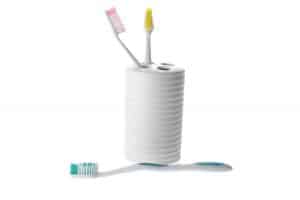
How Does Daily Dental Care Change for a Senior Who Has Alzheimer’s Disease?
One of the last issues you might think about after realizing your elderly family member has Alzheimer’s disease is her daily dental care. It’s a topic most people don’t think too much about until it becomes too difficult to manage every day. Your aging adult might be resistant to dental hygiene, making it far more complicated than you ever guessed.

Your Aging Family Member Might Forget How to Brush.
No one wants to believe that they’ll forget how to do things they’ve done for their entire lives, but Alzheimer’s disease changes so much. Your elderly family member might find one day that she doesn’t quite remember how to brush her teeth on her own. She might also find holding a toothbrush to be awkward. All of this could lead to your aging adult avoiding brushing.
Brushing Her Teeth Can Become a Sensory Overload.
Another factor that can cause your aging adult to stop brushing is that sensations become different as Alzheimer’s disease progresses. Toothbrush bristles can feel like sandpaper or the taste or texture of toothpaste can become overwhelming. You might want to talk to your aging adult’s dentist about other ways to help take care of her teeth.
More Frequent Dental Appointments Can Help.
One option that your elderly family member’s dentist might suggest is more frequent dental appointments. These are basically a deep cleaning appointment every one or two months. This helps to keep your aging adult’s teeth clean, but they can also help her dentist to spot problems more quickly.
You May Need to Brush for Your Aging Adult.
Brushing your senior’s teeth for her is definitely an option, but you might find that she’s resistant to having your help with personal care tasks such as this. One way to cope is to hire experienced elder care providers who can help your elderly family member brush her teeth and take care of any other personal care tasks that have become difficult. Since bathing and dressing also become difficult to manage, these could be other ways that elder care providers help your aging adult.
Do what you can to help alleviate stress associated with dental care for your aging adult.

